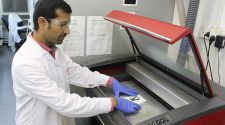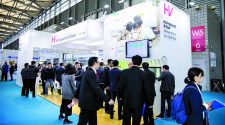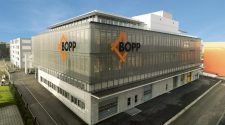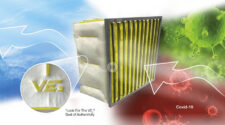The filtration industry is notably fractured in terms of its supply chain, as well as the end-uses for all types of filter media.
Six multi-billion-dollar companies, however – with combined total annual sales of over $90 billion – can be identified as being arguably the industry’s most influential:
• 3M
• Danaher Corporation
• Cummins
• Parker Hannifin
• Donaldson
• Mann+Hummel
All are major suppliers of filtration equipment and either manufacturers or significant buyers of nonwoven filter media.
3M
Few manufacturing companies have ever faced the spotlight 3M has been subjected to in 2020. The company has even been the subject of angry tweets from President Donald Trump.
The reason, of course, is 3M’s critical role in the supply of meltblown filter-based facemasks and respirators.
Even prior to COVID-19, 3M already produced around 1.1 billion facemasks at its global sites annually – specifically the highly effective N95 respirator-type masks. At the end of March, the company said it planned to increase its capacity to 2 billion globally within 12 months.
3M, however, has been estimated to make more than 55,000 separate products. With sales of $32.1 billion in 2019 and employing 96,000 people worldwide, the company, headquartered in St. Paul, Minnesota, has also recently been streamlining its structure recently, and now has just four operating business segments: Safety and Industrial, Transportation and Electronics, Health Care and Consumer.
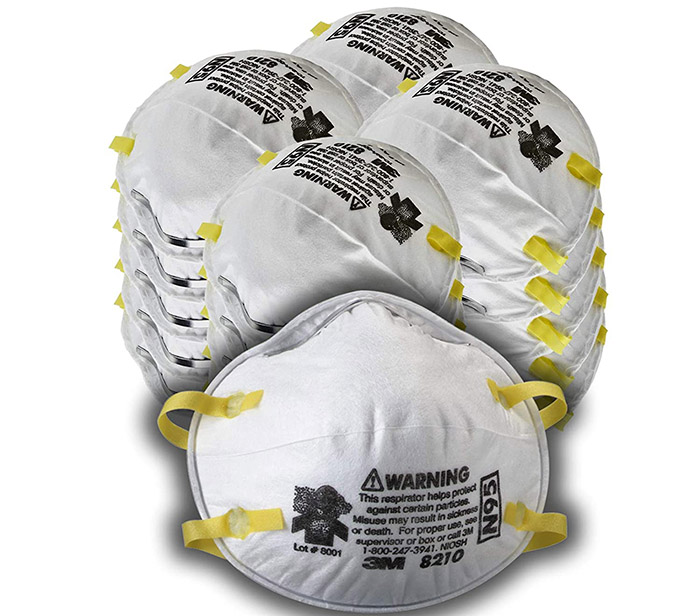
3M Purification
The company’s filtration business, largely related to 3M Purification, is estimated to be worth around 6%, or $1.9 billion of the company’s revenue in a usual year.
In addition to facemasks, 3M’s filter products are found in some highly profitable niche areas, not least in the specialized healthcare and water purification fields. The company also continues to take the lead in nonwoven patent activity globally, and although its key nonwoven technologies are based on decorative ribbons and tapes, abrasive pads and meltblown webs that were all developed over half a century ago, they are being constantly improved.
Meltblown media are the basis for many of the company’s products for the oil and gas industries, and 3M is one of the bigger filtration industry players to manufacture its own nonwovens, rather than buying them from third parties.
3M acquisitions
Notable acquisitions related to the filtration business by 3M include that of filter media manufacturer Cuno for $1.3 billion back in 2005. This business was subsequently renamed 3M Purification and manufactures a comprehensive range of mostly microfiltration products for the separation, clarification and purification of fluids and gases for the healthcare, bioprocessing, industrial, food and beverage, electronics and drinking water markets.
3M then acquired Powell Corporation, a manufacturer of spunbonded polyester mats used for membrane supports, in 2007.
With the breakup of Polypore International in February 2015, the company added microporous membrane capability that is highly complementary to a range of valuable medical products within its core nonwoven-based filtration platform.
Danaher Corporation
Two of the biggest acquisitions in the filtration industry in recent years have been those by Danaher of Pall Corporation for $13.8 billion, completed in August 2015, and of the Biopharma business of General Electric (GE) for $21 billion, completed in March this year, and now renamed Cytiva. New York-headquartered Danaher had 2019 sales of $18 billion and 67,000 employees globally. Cytvia should see the company’s sales grow considerably in 2020.
The business is broken down into three divisions – Life Sciences (2019 sales of $7 billion), Diagnostics ($6.6 billion) and Environmental and Applied Solutions ($4.4 billion). Both Pall and Cytiva are now part of the company’s Life Sciences business.
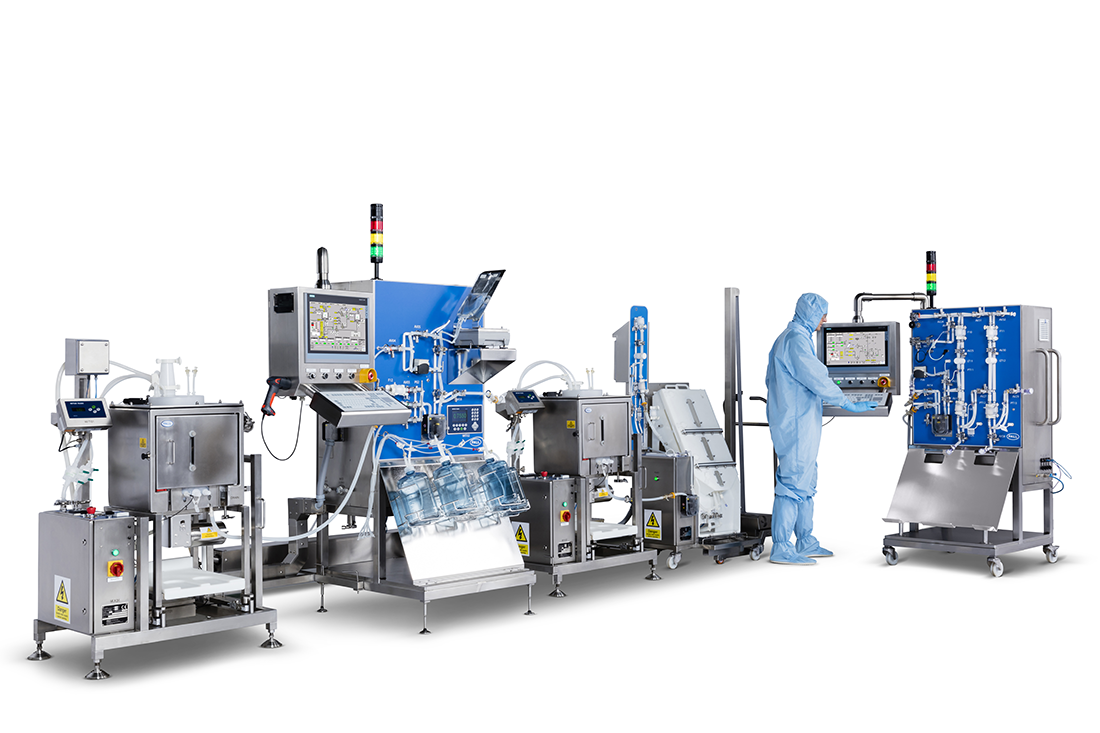
Pall
Danaher entered the filtration, separation and purification business via the acquisition of Pall Corporation, and a key driver for it was Pall’s leading position in technology and filter media for bioprocessing.
Of Pall’s sales, around 60% were generated by consumables at the time of its acquisition – principally filters made with the company’s proprietary branded filter media, which include membranes produced by chemical film casting, meltblown and wetlaid nonwovens and metal products, as well as smaller capital goods products such as housings. The remaining 40% of sales were generated by larger capital goods, typically including proprietary filtration systems and associated hardware.
As a condition of this year’s GE Biopharma acquisition, Danaher was required to sell a number of its bioprocessing filtration assets to Sartorius AG for approximately $825 million.
Cummins
Cummins Inc., headquartered in Columbus, Indiana, was founded in 1919 as one of the first diesel engine manufacturers. Today it supplies both diesel and natural gas engines, as well as engine-related component products, including filtration, turbochargers, fuel systems, controls systems, air handling systems and electric power generation systems.
The company sells its products to OEMs, distributors and other customers worldwide through a network of approximately 600 company-owned and independent distributor locations and approximately 7,600 dealers in more than 190 countries.
With total global sales of $23.6 billion in 2019, Cummins employed approximately 61,650 people worldwide at the end of December 2019. It now has five operating segments: Engine, Distribution, Components, Power Systems and New Power.
Within the Components segment, four sub-sectors are reported — filtration, emission solutions, turbo technologies, electronics and fuel systems and automated transmissions. Filtration sales in this segment were just under $1.3 billion in 2019, with a comparative figure applying to filtration-related activities and parts within the Distribution segment.
The filtration industry is notably fractured in terms of its supply chain, as well as the end-uses for all types of filter media. Six multi-billion-dollar companies, however – with combined total annual sales of over $90 billion – can be identified as being arguably the industry’s most influential …
Cummins Filtration
Cummins Filtration, headquartered in Nashville, Tennessee, is a dedicated filter media manufacturing operation and a leading manufacturer of air, fuel, hydraulic and lube filtration, chemicals and exhaust system technology for engine-powered equipment.
As such, it supplies over 8,300 products including air filters, fuel filters, fuel water separators, lube filters, hydraulic filters, coolant, diesel exhaust fluid, fuel additives and other filtration systems.
COVID-19 action
In April this year, Cummins announced an agreement with 3M to manufacture high-efficiency, three-layer particulate filters for use in 3M facemasks and PAPRs (powered air purifying respirators), in the fight against Covid-19.
Cummins’ NanoNet and NanoForce filter media employ DuPont’s Hybrid Membrane Technology (HMT) and are usually employed in air, fuel and oil filtration products used in heavy-duty diesel engines to prevent long-term engine wear.
By the beginning of July, the company had provided more than 14 tons of the filtration media to 3M and mask manufacturers across the globe, employed to produce more than eight million masks.
Parker Hannifin
During 2017, Parker-Hannifin acquired Clarcor, a diversified air and liquid filter company that had 5,773 employees at 97 operating facilities in 20 countries at the end of 2016, and sales for that year of just under $1.5 billion.
With Clarcor incorporated, Parker-Hannifin, headquartered in Cleveland, Ohio, is now a huge operation with 55,000 employees worldwide and sales in its financial year to June 30th 2020 of $13.7 billion.
It lists its activities as the provision of filters, systems and diagnostics solutions to monitor and remove contaminants from fuel, air, oil, water and other liquids and gases.
The group has approximately 459,000 customers who purchase its products throughout virtually every significant manufacturing, transportation and processing industry, and no single customer accounts for more than 3% of the company’s sales.
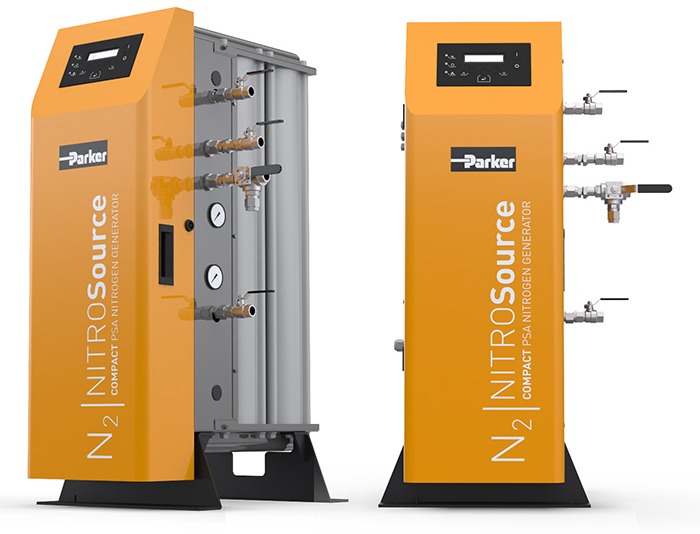
Growth
Parker-Hannifin has been in the filtration business since 1968, and has grown over many years by acquisition, as well as organically.
In 2007, for example, it added 13 businesses, adding nearly $1 billion in annualized revenue and thousands of employees. The most notable among these acquisitions was UK-based Domnick Hunter, with which Parker-Hannifin had already had a working relationship for over 20 years. Parker domnick hunter is now the global leader in the filtration of oxygen, nitrogen and zero air for air purification.
Clarcor had also grown through acquisitions. During 2016, for example, it acquired both FibeRio, the developer of nanofiber technology based in McAllen, Texas, for $11.9 million, and TDC Filter Manufacturing, of Bolingbrook, Illinois, a manufacturer of pleated filter bags, for $11.3 million.
Parker-Hannifin’s Filtration and Engineered Materials business now has annual sales of over €4 billion.
Donaldson
Despite the use of its products in many other kinds of engine, Donaldson does not compete in the conventional automotive filtration market.
The company achieved overall sales of over $2.8 billion in its financial year to the end of July 2019, and reports that expenditure on filter media constitutes 17% of its raw material costs.
Donaldson’s cost of sales for the 2019 financial year is put at around $1.9 billion, of which raw materials accounted for between 60-65%. This means Donaldson spends roughly in the region of $185-200 million on filter media annually. Further, Donaldson reports that it buys its filter media from just two suppliers and works closely with them on the development of proprietary nonwoven processes and products.
Within the $80 billion wider filtration market, Donaldson’s target markets are within eight categories with a combined market value of around $40 billion.
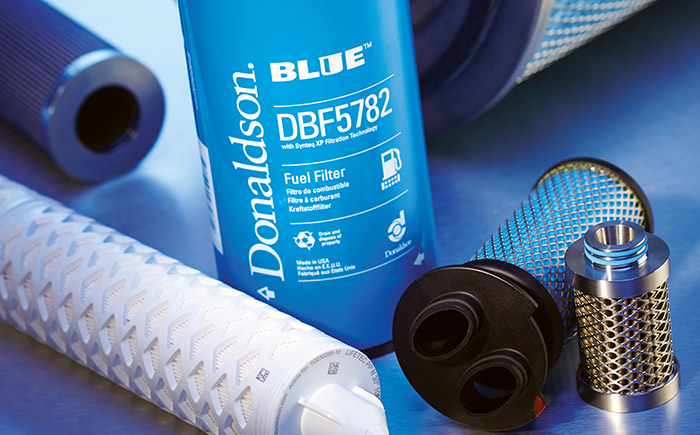
Donaldson has two business segments: Engine Products and Industrial Products.
Engine products
The company’s Engine Products division, which accounted for 68% of 2019 sales ($1,926), sells to original equipment manufacturers (OEMs) in the construction, industrial, mining, agriculture and transportation markets and to independent distributors, OEM dealer networks, private label accounts and large private fleets. Products include air intake systems, exhaust systems, liquid filtration systems and replacement filters.
Industrial products
The company’s Industrial Products division – 32% of sales in 2019 ($919 million) – sells to various industrial end-users, OEMs of gas-fired turbines and end-users requiring highly purified air. Products include dust, fume and mist collectors, compressed air purification systems, static and pulse clean air filter systems, and other specialized air filtration systems for diverse applications.
Specifically for the transportation sector, engine and vehicle products can be broken down into air filters, oil, fuel and coolant filtration.
Aftersales market
The aftersales market is particularly important to Donaldson, which has a network of approximately 600 wholly owned and independent distributor locations and over 7,400 dealer locations in more than 190 countries and territories.
In its 2019 financial year, sales of replacement parts and consumables grew to more than 68% of Engine Products revenue, with both of its divisions experiencing double-digit increases from the previous year.
Donaldson employed approximately 14,100 people at its worldwide operations at 31 July 2019.
Mann+Hummel
With record 2019 sales of €4.2 billion ($5 billion), the family-owned Mann+Hummel Group, headquartered in Ludwigsburg, Germany, is a world leader in liquid and air filter and intake systems and cabin filters.
The company now employs 22,000 people at 80 locations in 28 countries, with business areas being automotive, industrial air and water. It has a portfolio of over 73,000 products, the vast majority of which are directly related to filtration.
Automotive original equipment
The component supplier’s share in the value-added process of a vehicle is already over 70%, the company reports. To keep coordination costs low, there is an increasing demand for comprehensive systems and modules.
As a system partner for OEMs, Mann+Hummel supplies complete solutions, such as the air intake system. The range of liquid filter systems offered by Mann+Hummel is equally broad, with plastic or aluminum housings for spin-on filters or metal-free filter elements. A complete oil filter module/system also contains multi-functional components, such as integrated oil-water-heat exchangers, crankcase ventilation, oil pressure switches, sensors or compact valves.
The company supplies its Mann-Filter brand products in the aftermarket to fit most vehicles around the world.
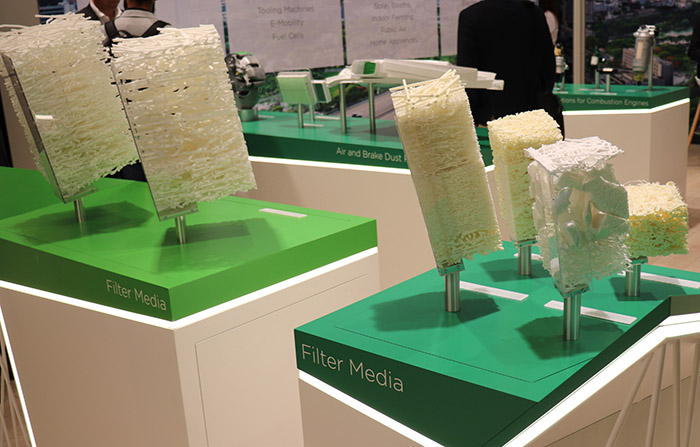
Industrial filtration
With products in modular kit form or with customer-specific developments, Mann+Hummel supplies many different industrial filtration solutions.
The range of applications for these products includes construction machinery, boats, power engineering, EDM machines, transmissions, forklift trucks, compressors, agricultural machinery, railway vehicles, ships, vacuum pumps, combustion engines, motorized small devices and equipment such as compacters, lawnmowers and industrial vacuum cleaners.
Water filtration
Mann+Hummel makes membranes and systems for a wide variety of applications including ultrafiltration, bio-membrane reactors and reverse osmosis. In May 2014 the company acquired 50% of the shares of Microdyn-Nadir a leading supplier of flat membranes and modules for micro, ultra and nanofiltration. Microdyn-Nadir’s headquarters are in Wiesbaden, Germany, and it also has subsidiaries in Xiamen, China and Raleigh, USA. The company is aiming to build a bigger presence in the water filtration market going forward and has subsequently acquired two more companies operating in the water filtration sector.
* This article was updated with current information on 4 Sept. 2020.


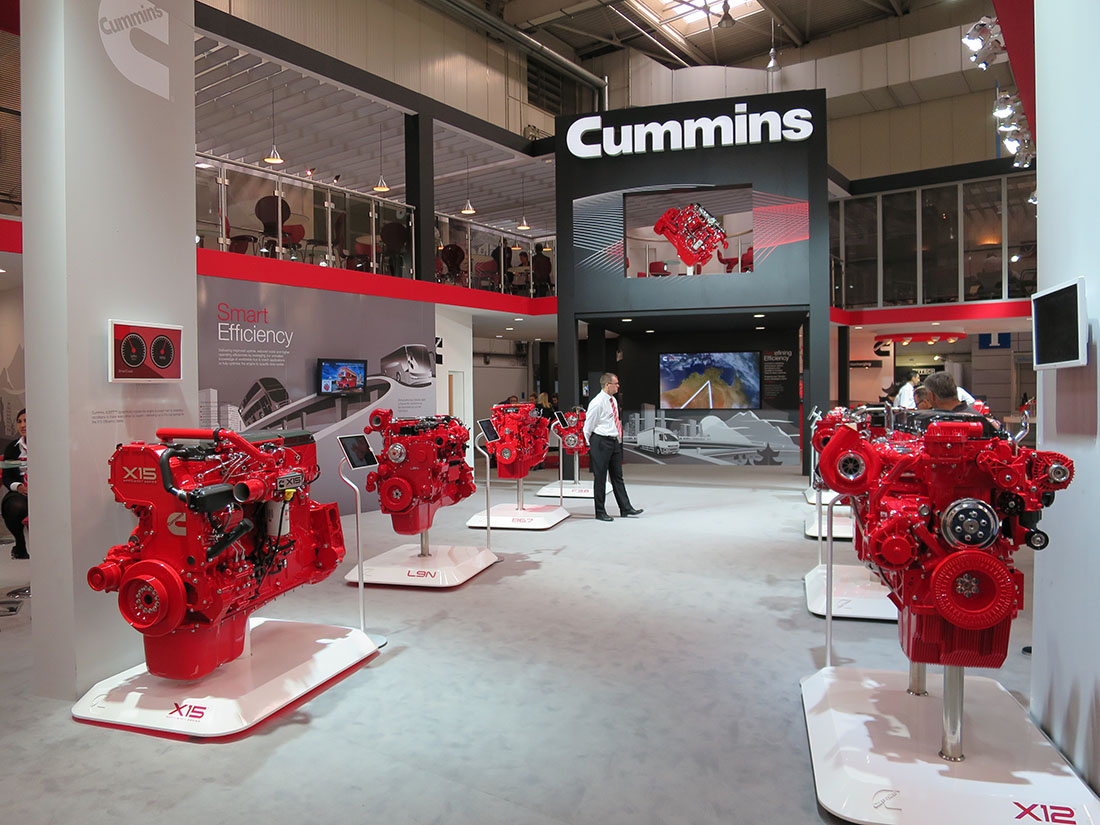
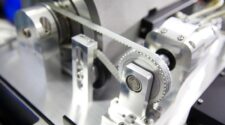
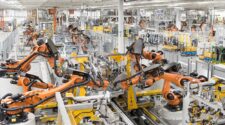
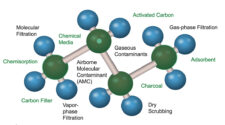
![Figure 1: Heat Exchanger Proventics GMBH.[22]](https://www.filtnews.com/wp-content/uploads/IFN_2_2024_crimpedmicrofiberyarns_Fig.-1-Heat-exchanger-225x125.jpg)
